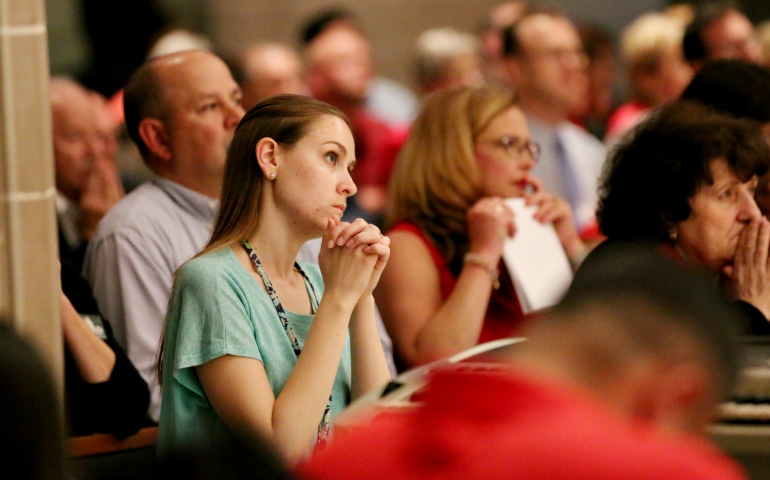
Members of the Detroit archdiocesan synod and others pray during Mass on the vigil of Pentecost June 3 at the Cathedral of the Most Blessed Sacrament in Detroit. (CNS/Archdiocese of Detroit/Jonathan Francis)
Nearly seven months after the Detroit Archdiocese's Synod 16, Archbishop Allen Vigneron released a pastoral letter outlining the synod results, along with launching a new website and coat of arms to "Unleash the Gospel."
The letter was released following the Pentecost vigil Mass on June 3. Vigneron wrote that the letter is meant to "serve as the charter for implementing the fruit of Synod 16." In an accompanying video, Vigneron states that the letter and synod "is not just the project of a year. This is a project of a generation."
"The Synod was the ignition spark that is to set the Archdiocese ablaze. Its goal was nothing less than a radical overhaul of the Church in Detroit, a complete reversal of our focus from an inward, maintenance-focused church, to an outward, mission-focused church," writes Vigneron in the letter.
During the synod weekend, delegates voted on propositions broken down into three categories: individuals and families; parishes; and archdiocesan central services. Delegates chose nine crucial initiatives, which the archbishop endorsed in his letter. The archbishop also outlines multiple "action steps" to help each initiative become reality.
To assist with the implementation of these steps, Vigneron will establish the "New Evangelization Council" by this summer and plans on giving an annual report every Pentecost.
Vigneron ends the letter contemplating the new future for the archdiocese set in motion by the synod.
"My hope is that [the archdiocese] will be a community of joyful missionary disciples and of saints united in Jesus — that there will even be a whole host of causes for beatification! — and that southeast Michigan will be a place of the manifest presence of God."
The Diocese of Bridgeport, Connecticut, which held its synod in 2014, completed its final post-synod session in April. According to Fairfield County Catholic, the diocesan newspaper, the final session was a chance to hear updates on synod initiatives, as well as an opportunity for delegates to reflect on their experience.
The paper reports that the group received updates on several of the key synod recommendations "including the development of the Leadership Institute, the Catholic Service Corp, ongoing pastoral and parish planning, and the recent reorganization into a new deanery structure."
Several other dioceses are in the early stages of their synod process. Unlike other dioceses, Springfield, Illinois, will hold its fourth diocesan synod in a series of sessions spread out through the year. The preliminary phase of the Springfield synod began in January. The diocese completed its first synod session May 20 and its process will conclude Nov. 26 with a final Mass.
"In the end, what makes this so important is that it is all about our future as a church: whether we will diminish or grow as a community of faith. I fervently pray that it will be the latter, showering our diocese with abundant blessings of unprecedented growth," wrote Springfield Bishop Thomas Paprocki on the synod website.
On April 11, Paprocki released a letter outlining seven points for the synod delegates to consider. One of the points asks the synod to consider "the possibility of restoring the Sacraments of Initiation to their proper order so as to promote the discipleship and stewardship way of life more effectively." The proposal suggests the sacrament of confirmation take place before or concurrently with first Communion.
The letter also asks delegates to consider how to make Catholic education affordable to all.
"In recent decades, Catholic education has been operating under a consumer model in which parents who desire for their children to receive a Catholic education are required to pay for it, as though it were a product one purchases," the letter states. "Under the proposed model, parishes will adopt a stewardship model in which the entire parish considers it their shared responsibility to ensure that Catholic education and discipleship formation is made available to the next generation."
The letter suggests that parishes will be responsible for children's tuition, while families will be "expected to be actively involved in the life of the parish, including financially, so as not to abuse this model, while at the same time respecting those families who are genuinely in need."
Other proposals talk about the biblical practice of tithing, asking synod delegates to consider asking parishioners to tithe 8 percent of their income to parishes and 2 percent to charities. The letter also suggests ending an annual Catholic Services Appeal, which is a diocesan-wide fundraising campaign. Instead, it recommends parishes tithe 10 percent of their annual income to the diocese. From there, the diocese will tithe 10 percent of its annual income "to national and international collections."
The same day the Springfield Diocese released its letter, the Diocese of Burlington, Vermont, announced plans to hold its first synod since 1962. According to Catholic News Service, Bishop Christopher Coyne plans to hold the synod in the spring of 2018, saying it will be at least a yearlong project. Coyne plans on including both clergy and laity saying, "I will seek input from all. I will listen to all. And I will discern with you all."
[Kristen Whitney Daniels is a NCR Bertelsen intern. Her email address is kdaniels@ncronline.org.]


